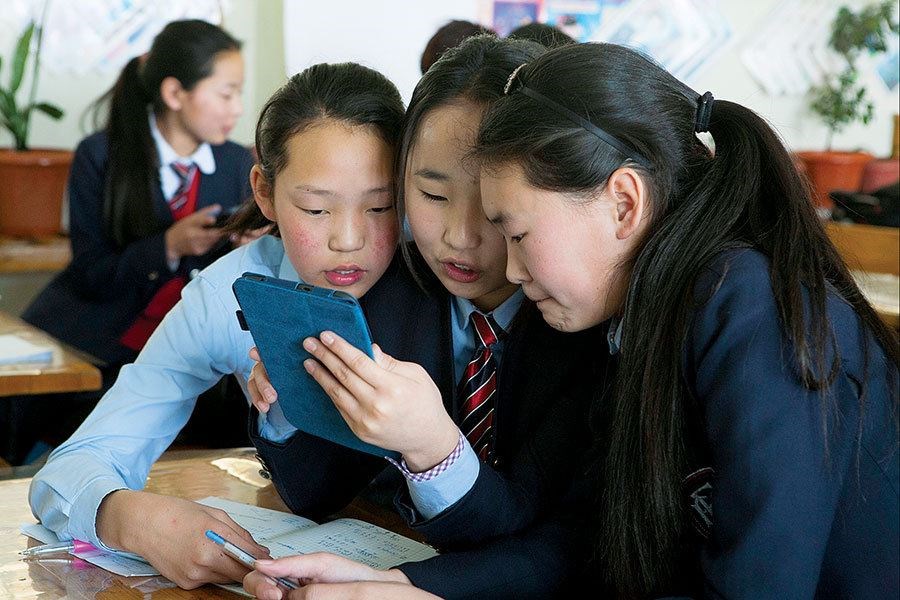Originally published in CS Monitor. Republished with permission.
Library for All is a nonprofit that provides young readers in developing countries with digital books in their mother tongue. Research suggests that children benefit from reading in their strongest language.
— RWANDA - For some students at Umubano Primary School, located just outside Kigali, Rwanda, being bilingual is a necessity. At Umubano, classes are taught in English – but at the end of the day, a significant number of students go home to parents who speak only Kinyarwanda. Although the school offers some lessons in Kinyarwanda, physical learning materials in the language aren’t easy to come by. The number of books available in Kinyarwanda is limited, says educator Amy Barnecutt, and the few owned by the school tend to be flimsy and in poor condition.
That’s where Library for All, a nonprofit organization that provides young readers in developing countries with digital books in their mother tongue, has come in. For the past two years, Umubano has partnered with Library for All so students can access a robust cloud-based library filled with culturally relevant books in Kinyarwanda and other languages.
 Students in Mongolia browse Library for All on a tabletLibrary for All
Students in Mongolia browse Library for All on a tabletLibrary for All
A goal of Library for All is to boost literacy in these regions, as research suggests that children benefit from reading and learning in their strongest language. But the initiative has another aim as well: to give young readers access to material that they can relate to and that helps build their sense of identity. This is one reason that Library for All recruits local volunteers to write books.
“Our mission is to make knowledge accessible to all equally, but it’s also to ensure that children have the ability to learn, dream, and aspire to lift themselves out of poverty,” says Tanyella Evans, cofounder and chief executive officer of Library for All, which is based in New York. “Part of that is having that dignity, that self-confidence – to see that you can be the protagonist of your own story.”
Library for All, founded in 2012 by Ms. Evans and Rebecca McDonald, currently exists in five countries: Rwanda, Congo, Haiti, Cambodia, and Mongolia. The organization optimizes its library for the electronic devices that people living in poverty in each region are most likely to have access to, such as low-cost phones or tablets.
Evans recalls one student in Haiti, a former victim of child slavery, who had returned to school after years out of the classroom. At first, she says, he couldn’t read out loud because of low self-esteem and reading-level deficiency. But after a few months of taking part in a program that incorporated Library for All’s digital library, he was “so excited” to get up in front of the class and read for his peers.
“Part of that was just reading in a language that was familiar to him – the language he speaks on the playground with his friends and at home with his family,” Evans says.
Research suggests there are numerous advantages to children learning in their mother tongue. A frequently cited 2008 UNESCO report found that children enrolled in mother tongue-based bilingual education programs performed better academically than students who learned only in their second language. They were also more likely to participate actively in the learning process and to feel confident about learning.
Storybooks are an important part of building literacy early on, says Carol Benson, associate professor of international and comparative education at Columbia University’s Teachers College in New York. And, she says, “when [children] are learning literacy for the first time, it’s easiest and most efficient for them to do that in their strongest language.”
Benefits all around
At Umubano Primary School, offering books in Kinyarwanda has not only aided students in developing language and comprehension skills, notes Ms. Barnecutt, country director for A Partner in Education, the nongovernmental organization that supports Umubano. It’s also made life easier for educators.
“As a teacher, allowing children to learn in their mother tongue helps to assess the true knowledge of the learners without the added complexity of foreign language translation,” she says.
Shortly after launching a pilot program in Cambodia last year, Library for All discovered one major challenge in bringing culturally relevant reading materials to the area’s children in their mother tongue: There just weren’t that many books to choose from.
Library for All’s digital library contained about 50 children’s books in the Khmer language. And so, Evans says, “we started thinking, ‘How can we create content locally in the community in a cost-effective and efficient way?’ ”
The answer: local writers’ workshops.
Earlier this year, Library for All piloted a series of workshops in Haiti, funded through a grant from the United States Agency for International Development, for volunteers from the region to write curriculum-appropriate books in Haitian Creole. Using software that keeps writers on track by detecting the difficulty of words and phrases, the volunteers created 109 books over the course of two weeks.
‘Valorizing the home culture’
Books can be “really useful for building identity and self-esteem, especially if girls and boys are both represented and culturally appropriate topics are taken up,” Professor Benson says. This makes books penned by local authors all the more valuable.
Page created on 2/18/2018 8:02:04 PM
Last edited 2/22/2018 10:14:34 PM
